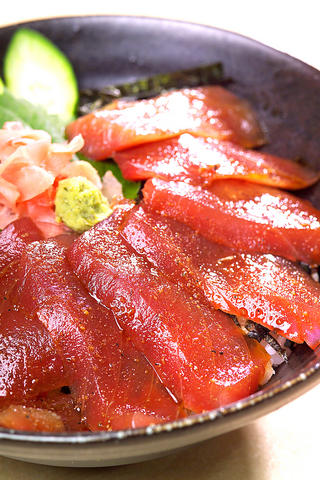The quality of a restaurant's rice can say much about its attitude toward the food it serves. In the case of Rice Cafe, a new establishment that opened last week specializing in Japanese "rice bowl" or donburi dishes (日式蓋飯), rice is given a high priority, and contributes as much to the enjoyment of the meal as the meat and vegetables that it accompanies.
Donburi are an option on virtually every Japanese restaurant menu. Made up of rice with a topping of fish, meat and vegetables, they are simple and filling. Rice Cafe has made a specialty of these dishes, and while it includes all the most common, such as oyakodon (egg, chicken and onion stew over rice, NT$130), katsudon (a pork cutlet and sauce on rice, NT$180), and tendon (tempura shrimp and vegetables on rice, NT$180), it also has many that are not so readily available.
Whether common or unusual, all the donburi are served over high quality koshihikari rice (越光米), which has an excellent texture; even when eaten plain it has a sweet flavor and is fragrant. This rice, which originates from Niigata, Japan, and which is now grown in Taiwan, has the same standing in Japanese cuisine as basmati rice has in Indian.

PHOTOS: COURTESY OF RICE CAFE
Apart from the rice, the second thing that distinguishes the donburi served at Rice Cafe is the care taken over the ingredients for the toppings. The restaurant has not shied away from placing its price point slightly above that of donburi in many Japanese chain restaurants, but you certainly get your money's worth. A case in point is the steak donburi, which, priced at NT$350, includes a nice piece of Australian prime fillet, grilled and sliced, which is served with a sauce of minced onion cooked in pan juices. The dish reflects a sophisticated appreciation of the ingredients used. Even the baby corn and mushrooms served as a garnish are cooked with a slight taste of the grill, but still very crisp and full of freshness. It is highly recommended as a light meal and more than a match for Taipei's traditional steakhouses.
The steak donburi, and a number of other higher-priced items such as the marinated raw tuna donburi (NT$280) and the salmon and roe donburi (NT$300) are only available in limited quantities and can quickly sell-out.
According to Brooke Tseng (曾子倫), who oversees operations at Rice Cafe, one of the most popular dishes is the deep-fried seafood donburi (NT$180), which is widely available in Japan but rarely seen in Taiwan.
The company behind Rice Cafe also operates the Rakumenya (樂麵屋) ramen restaurant next door, which has already proved successful by offering authentic Japanese flavors, distinct from Taiwanese-style Japanese food.
Each donburi comes with a bowl of miso soup and some pickled vegetables. A small array of beverages is on offer, but the soup, made from Japanese white miso, is sufficiently tasty and refreshing to wash down the meal.

Last week, on the heels of the recall election that turned out so badly for Taiwan, came the news that US President Donald Trump had blocked the transit of President William Lai (賴清德) through the US on his way to Latin America. A few days later the international media reported that in June a scheduled visit by Minister of National Defense Wellington Koo (顧立雄) for high level meetings was canceled by the US after China’s President Xi Jinping (習近平) asked Trump to curb US engagement with Taiwan during a June phone call. The cancellation of Lai’s transit was a gaudy

Following the shock complete failure of all the recall votes against Chinese Nationalist Party (KMT) lawmakers on July 26, pan-blue supporters and the Chinese Communist Party (CCP) were giddy with victory. A notable exception was KMT Chairman Eric Chu (朱立倫), who knew better. At a press conference on July 29, he bowed deeply in gratitude to the voters and said the recalls were “not about which party won or lost, but were a great victory for the Taiwanese voters.” The entire recall process was a disaster for both the KMT and the Democratic Progressive Party (DPP). The only bright spot for

From Godzilla’s fiery atomic breath to post-apocalyptic anime and harrowing depictions of radiation sickness, the influence of the nuclear bombings of Hiroshima and Nagasaki runs deep in Japanese popular culture. In the 80 years since the World War II attacks, stories of destruction and mutation have been fused with fears around natural disasters and, more recently, the Fukushima crisis. Classic manga and anime series Astro Boy is called “Mighty Atom” in Japanese, while city-leveling explosions loom large in other titles such as Akira, Neon Genesis Evangelion and Attack on Titan. “Living through tremendous pain” and overcoming trauma is a recurrent theme in Japan’s

As last month dawned, the Democratic Progressive Party (DPP) was in a good position. The recall campaigns had strong momentum, polling showed many Chinese Nationalist Party (KMT) lawmakers at risk of recall and even the KMT was bracing for losing seats while facing a tsunami of voter fraud investigations. Polling pointed to some of the recalls being a lock for victory. Though in most districts the majority was against recalling their lawmaker, among voters “definitely” planning to vote, there were double-digit margins in favor of recall in at least five districts, with three districts near or above 20 percent in